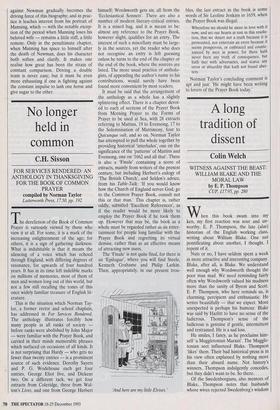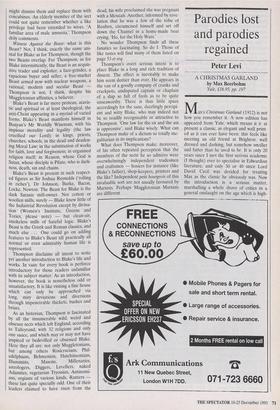A long tradition of dissent
Colin Welch
WITNESS AGAINST THE BEAST: WILLIAM BLAKE AND THE MORAL LAW by E. P. Thompson CUP, £17.95, pp. 280 When this book swam into my ken, my first reaction was sour and un- worthy. E. P. Thompson, the late (alas) historian of the English working class, writing about William Blake. One nut pontificating about another, I thought. I repent of it.
Nuts or no, I have seldom spent a week in more attractive and interesting company. Blake, after all, is Blake. We understand well enough why Wordsworth thought the poor man mad. We need reminding fairly often why Wordsworth valued his madness more than the sanity of Byron and Scott. E. P. Thompson, who here reminds us, is charming, percipient and enthusiastic. He writes beautifully — that we expect. More unexpected is perhaps his humour. Blake was said by Hazlitt to have no sense of the ludicrous. Thompson's sense of the ludicrous is genuine if gentle, intermittent and restrained. He is a sad loss.
He smiles, I fancy, as he proclaims him- self 'a Muggletonian Marxist'. The Muggle- tonian sect influenced Blake. Thompson `likes' them. Their bad historical press is in his view often explained by nothing more than their absurd name. Not history's winners, Thompson indulgently concedes, but they didn't want to be. So there.
Of the Swedenborgians, also mentors of Blake, Thompson notes that husbands whose wives rejected Swedenborg's wisdom might dismiss them and replace them with concubines. An elderly member of the sect could not quite remember whether a like privilege had been extended to wives. 'A familiar area of male amnesia,' Thompson drily comments.
Witness Against the Beast: what is this Beast? Not, I think, exactly the same ani- mal for Blake as for Thompson, though the two Beasts overlap. For Thompson, as for Blake intermittently, the Beast is an acquis- itive trader and exploiter, a face-grinder, a rapacious buyer and seller, a free-market Beast armed now with nuclear weapons, a rational, modern and secular Beast Thompson is not, I think, despite his Muggletonian affinities, a believer.
Blake's Beast is far more protean, atavis- tic and spiritual or at least theological, the anti-Christ appearing in a myriad of varied forms. Blake's Beast manifests himself in Bunyan's Mr Worldly Wiseman, with his impious morality and legality (the law crucified our Lord); in kings, priests, churches, schools, in the dead and deaden- ing Moral Law; in the substitution of works for faith, love and forgiveness; in organised religion itself; in Reason, whose God is Satan, whose disciple is Pilate, who is dark- ness, death, sin and chains.
Blake's Beast is present in such respect- ed figures as Sir Joshua Reynolds (`rolling in riches'), Dr Johnson, Burke, Bacon, Locke, Newton. The Beast for Blake is the dark Satanic mill-owner. Not cotton or woollen mills, surely — Blake knew little of the Industrial Revolution except by divina- tion (Women's Institute, Greens and Tories, please note) — but clean-air, smokeless mills of hateful logic. Blake's Beast is the Greek and Roman classics, and much else . . One could go on adding features to Blake's Beast till practically all normal or even admirably human life is represented.
Thompson disclaims all intent to write yet another introduction to Blake's life and works. In vain: for every book is perforce introductory for those readers unfamiliar with its subject matter. As an introduction, however, the book is nonetheless odd or unsatisfactory. It is like visiting a fine house which can only be approached via long, miry deviations and diversions through impenetrable thickets, bushes and briars.
As an historian, Thompson is fascinated by all the innumerable wild, weird and obscure sects which left England, according to Talleyrand, with 32 religions and only one sauce, and which may or may not have inspired or bedevilled or obsessed Blake. Here they all are: not only Muggletonians, but among others Rosicrucians, Phil- adelphians, Behmenists, Hutchinsonians, Illuminists, Masons, Millenaries, astrologers, Diggers, Levellers, naked Adamites, vegetarian Tryonists, Antinomi- ans, orgiasts of various kinds, Ranters these last quite specially odd. One of their leaders claimed to have risen from the dead; his wife proclaimed she was pregnant with a Messiah. Another, informed by reve- lation that he was a Jew of the tribe of Reuben, circumcised himself and set off down the Channel in a home-made boat crying, 'Ho, for the Holy Wars.'
No wonder Thompson finds all these fanatics so fascinating. So do I Those of like tastes will find many of them listed on page 53 et seq.
Thompson's overt serious intent is to place Blake in a long and rich tradition of dissent. The effect is inevitably to make him seem dottier than ever. He appears in the van of a goodly company of cranks and crackpots, undisputed captain or chaplain of a ship so full of fools as to be quite unseaworthy. There is thus little space accordingly for the sane, dazzlingly percipi- ent and witty Blake, who may indeed not be so readily recognisable or attractive to Thompson. 'One law for the ox and the ass is oppressive', said Blake wisely. What can Thompson make of a dictum so totally Me- galitarian in its implications?
What does Thompson make, moreover, of his often repeated perception that the members of the sects he so admires were overwhelmingly independent tradesmen and craftsmen — hosiers for instance (like Blake's father), shop-keepers, printers and the like? Independent petit bourgeois of this invaluable sort are not usually favoured by Marxists. Perhaps Muggletonian Marxists are different . . .











































































































 Previous page
Previous page